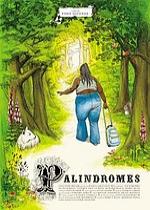

Knight at the Movies ARCHIVES

Transformations:
Beautiful Boxer, Palindromes
4-27-05 Knight at the Movies column
By Richard Knight, Jr.
Beautiful Boxer is the amazing true story of Thai kickboxing champion and transsexual Parinya Charoenphol,
known as Nong Toom before his sex change. Toom was renowned not only for his kickboxing prowess but for
wearing makeup while laying waste to his opponents in the ring. This alone makes the character a much more
fascinating underdog than his fictional counterparts in the Rocky series and Million Dollar Baby. And unlike most
boxing films of this ilk, director Ekachai Uekrongtham – for the most part – soft pedals the melodramatic schmaltz
and allows Toom a quiet dignity. It’s an exceedingly polite picture (which also mirrors Toom’s character) without
the preachy uplift that usually wrecks underdog movies for me.
Toom (who is beautifully played by professional Thai kickboxer Asanee Suwan in his movie debut) relates his story
to a reporter via flashbacks. They begin with his younger self dressing in drag and applying a discarded lipstick for
fun – this to the horror of his father and disapproval of his mother. It’s not long before Toom’s sent off to monk
school but he soon realizes that he’s different than the other boys, “Sometimes at night everything’s quiet – but not
in my heart,” he says quietly.
Toom is also distracted by mounting family catastrophes and when by accident he’s taunted into his first kickboxing
match, wins, and is handed a handful of cash, he realizes that his natural abilities can help pull his family out of
poverty. He’s soon living at kickboxing camp, being personally trained by the camp’s director and putting on
lipstick in secret in the outhouse. He finds an ally in the director’s wife, who cooks for the trainees. When she
catches Toom with the lipstick she hands him his first eye make-up kit and a conspiratorial smile instead of a
lecture.
Meanwhile, Toom has fallen under the spell of another kickboxer, the good looking Nat and one sultry night, they
both end up in the bathing house at the same time. It seems as if the Love That Dare Not Speak Its Name is about
to erupt but the movie, as coy as Toom’s character, pulls back and soon, Nat transfers to another camp. After that
there is no further hint of romance or sex in the picture.
Eventually, the coach catches his wife and Toom giggling and putting on make-up but instead of disapproving,
realizes that this is the edge that might single out his kickboxer from the herd for some media attention. That’s
naturally what happens when Toom makes his first appearance in the ring wearing lipstick. With each win comes
more attention and respect but also more of the freak factor until Toom finds himself in a giant arena match going
up against a female wrestler. Disgusted, and emotionally ready for his sex change, he decides to quit kickboxing –
for modeling – though we don’t see any of his subsequent photo shoots.
At the conclusion of this – believe it or not – delicately nuanced picture – in which fragility is beautifully contrasted
with the brutal violence of the boxing ring – there’s a series of photos that detail Toom’s transformation. The
photos encapsulate a truly remarkable journey. They also reminded me that, due to time constraints I’m sure,
Toom’s rather intricate story has necessarily been told through a series of broad strokes with a lot of details left
out. This is a movie that makes you leave the theatre wanting to read the book – and I mean that as a compliment.
+++++++++++++++++++++++++++++++++++++++++++++++++++++++++++++++
Writer-director Todd Solondz, champion of nerds, eats his young. At the outset of Palindromes the so off beat
that we lose the beat director kills off his greatest creation, Dawn Wiener, the pre-teen loser from his
breakthrough feature, Welcome to the Dollhouse. That is very sad as Dawn (which introduced the wonderful
young out lesbian actor Heather Matarazzo to audiences) was surely Solondz’s most original creation. He replaces
Dawn with another young teenage girl, the dreamy, baby-voiced Aviva. The idea of having the 13-year old Aviva,
who just wants to have a baby, played by a series of different actresses (including Jennifer Jason-Leigh) is
interesting at first but ultimately emphasizes that it takes a lot of different Avivas to create the impact of just one
Dawn.
Solondz makes the blackest of black comedies about suburbia and Palindromes is no exception. Here,
accompanied by a saccharine sweet soundtrack, the director elicits uncomfortable laughs out of abortion and
Christian fundamentalists (much more sharply observed in Citizen Ruth) and leaves room for his favorite subject,
pedophilia, all viewed through the eyes of the detached Aviva. Smothered by her alternately weepy and impatient
mother (Ellen Barkin in a hambone performance), Aviva seems a blank canvas upon which all the other characters
desperately try to leave an impression (Debra Monk as the über foster parent Mother Sunshine tops them all).
This is standard issue Solondz territory – he is typically merciless in his derision toward his adult characters and
“popular” kids, sympathetic to society’s “put upons” – and he makes it easy to respond in like manner.
Palindromes is somewhat a return to form and I certainly enjoyed it a lot more than the poisonous Happiness or
the sour Storytelling but this return to the dollhouse seems to point out that Solondz has nothing fresh left to
observe about the dehumanizing effects and cruelty of suburbia and needs to leave the suburbs behind.
Beautiful Boxer, Palindromes
4-27-05 Knight at the Movies column
By Richard Knight, Jr.
Beautiful Boxer is the amazing true story of Thai kickboxing champion and transsexual Parinya Charoenphol,
known as Nong Toom before his sex change. Toom was renowned not only for his kickboxing prowess but for
wearing makeup while laying waste to his opponents in the ring. This alone makes the character a much more
fascinating underdog than his fictional counterparts in the Rocky series and Million Dollar Baby. And unlike most
boxing films of this ilk, director Ekachai Uekrongtham – for the most part – soft pedals the melodramatic schmaltz
and allows Toom a quiet dignity. It’s an exceedingly polite picture (which also mirrors Toom’s character) without
the preachy uplift that usually wrecks underdog movies for me.
Toom (who is beautifully played by professional Thai kickboxer Asanee Suwan in his movie debut) relates his story
to a reporter via flashbacks. They begin with his younger self dressing in drag and applying a discarded lipstick for
fun – this to the horror of his father and disapproval of his mother. It’s not long before Toom’s sent off to monk
school but he soon realizes that he’s different than the other boys, “Sometimes at night everything’s quiet – but not
in my heart,” he says quietly.
Toom is also distracted by mounting family catastrophes and when by accident he’s taunted into his first kickboxing
match, wins, and is handed a handful of cash, he realizes that his natural abilities can help pull his family out of
poverty. He’s soon living at kickboxing camp, being personally trained by the camp’s director and putting on
lipstick in secret in the outhouse. He finds an ally in the director’s wife, who cooks for the trainees. When she
catches Toom with the lipstick she hands him his first eye make-up kit and a conspiratorial smile instead of a
lecture.
Meanwhile, Toom has fallen under the spell of another kickboxer, the good looking Nat and one sultry night, they
both end up in the bathing house at the same time. It seems as if the Love That Dare Not Speak Its Name is about
to erupt but the movie, as coy as Toom’s character, pulls back and soon, Nat transfers to another camp. After that
there is no further hint of romance or sex in the picture.
Eventually, the coach catches his wife and Toom giggling and putting on make-up but instead of disapproving,
realizes that this is the edge that might single out his kickboxer from the herd for some media attention. That’s
naturally what happens when Toom makes his first appearance in the ring wearing lipstick. With each win comes
more attention and respect but also more of the freak factor until Toom finds himself in a giant arena match going
up against a female wrestler. Disgusted, and emotionally ready for his sex change, he decides to quit kickboxing –
for modeling – though we don’t see any of his subsequent photo shoots.
At the conclusion of this – believe it or not – delicately nuanced picture – in which fragility is beautifully contrasted
with the brutal violence of the boxing ring – there’s a series of photos that detail Toom’s transformation. The
photos encapsulate a truly remarkable journey. They also reminded me that, due to time constraints I’m sure,
Toom’s rather intricate story has necessarily been told through a series of broad strokes with a lot of details left
out. This is a movie that makes you leave the theatre wanting to read the book – and I mean that as a compliment.
+++++++++++++++++++++++++++++++++++++++++++++++++++++++++++++++
Writer-director Todd Solondz, champion of nerds, eats his young. At the outset of Palindromes the so off beat
that we lose the beat director kills off his greatest creation, Dawn Wiener, the pre-teen loser from his
breakthrough feature, Welcome to the Dollhouse. That is very sad as Dawn (which introduced the wonderful
young out lesbian actor Heather Matarazzo to audiences) was surely Solondz’s most original creation. He replaces
Dawn with another young teenage girl, the dreamy, baby-voiced Aviva. The idea of having the 13-year old Aviva,
who just wants to have a baby, played by a series of different actresses (including Jennifer Jason-Leigh) is
interesting at first but ultimately emphasizes that it takes a lot of different Avivas to create the impact of just one
Dawn.
Solondz makes the blackest of black comedies about suburbia and Palindromes is no exception. Here,
accompanied by a saccharine sweet soundtrack, the director elicits uncomfortable laughs out of abortion and
Christian fundamentalists (much more sharply observed in Citizen Ruth) and leaves room for his favorite subject,
pedophilia, all viewed through the eyes of the detached Aviva. Smothered by her alternately weepy and impatient
mother (Ellen Barkin in a hambone performance), Aviva seems a blank canvas upon which all the other characters
desperately try to leave an impression (Debra Monk as the über foster parent Mother Sunshine tops them all).
This is standard issue Solondz territory – he is typically merciless in his derision toward his adult characters and
“popular” kids, sympathetic to society’s “put upons” – and he makes it easy to respond in like manner.
Palindromes is somewhat a return to form and I certainly enjoyed it a lot more than the poisonous Happiness or
the sour Storytelling but this return to the dollhouse seems to point out that Solondz has nothing fresh left to
observe about the dehumanizing effects and cruelty of suburbia and needs to leave the suburbs behind.
A Transgendered kickboxer and Six Actors Sharing One Body

